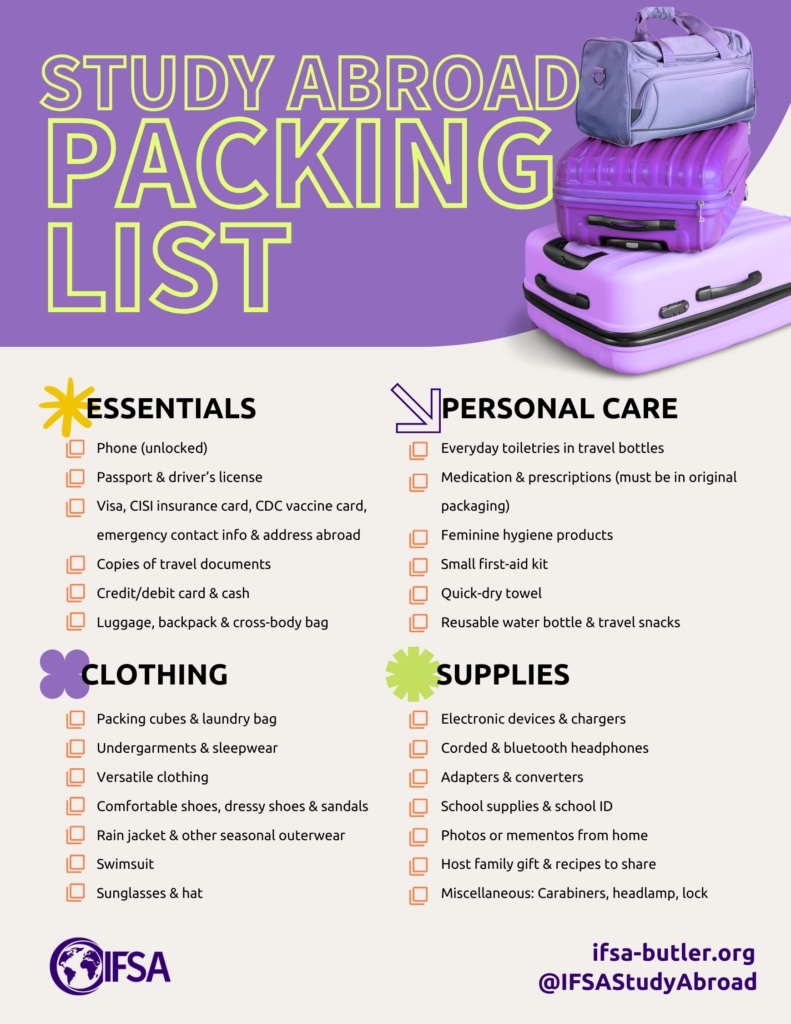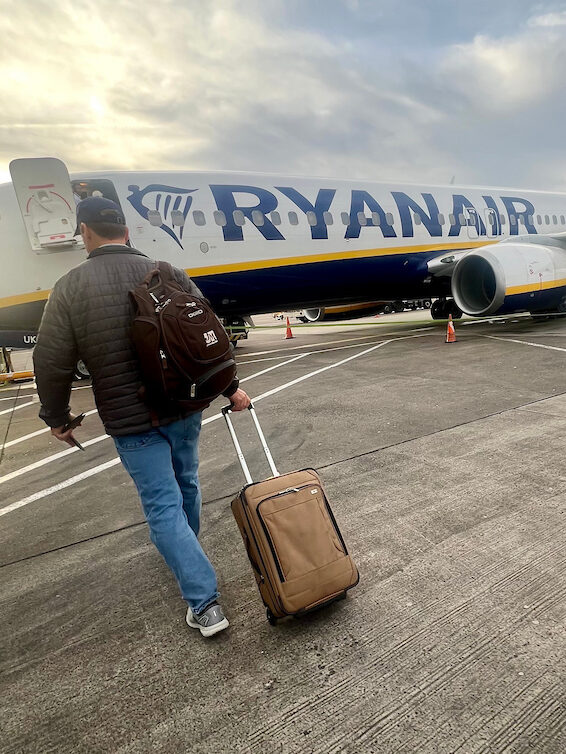What to Pack for Study Abroad


Studying abroad is an exciting, once-in-a-lifetime experience, but thinking about what to pack for study abroad can feel overwhelming. This guide breaks down what to bring and shares best practices to help make your experience less stressful and more organized.
Packing the essentials:
- Phone– This is arguably one of the most crucial items. Check if your phone is unlocked so you can use a local SIM card, or research international plans to utilize through your carrier. There are also apps available that offer local eSIMs, so be sure to research your options.
- Travel documents– These items should be in order before you start packing your bags. These documents include your passport, student visa, and more. (See What Travel Documents Do I Need to Study Abroad for more information.)
- IFSA pro tip: Make photocopies or digital backups of your most important documents like your passport, visa, and insurance cards, and store them in a separate bag or email them to yourself.
- Money- Bring an internationally accepted debit or credit card, plus a small amount of local currency for when you arrive. This way, you’re covered for essentials on day one. Also, a small cross body shoulder bag is a safe and accessible way to store your ID, phone, and spending money.
- IFSA pro tip: Let your bank know you are traveling to avoid account holds or security concerns.
- Luggage– Consider what type of luggage will best fit your travel plans and living situation abroad. Rolling suitcases are perfect for long stays in one location since they are easy to transport to and from the airport. Travel backpacks are a better fit if you plan on traveling frequently on weekends. Don’t forget to research your airline’s carry on luggage size regulations so you’re not surprised at the airport.
- IFSA pro tip: Pack a change of clothes, medications, chargers, some toiletries, and travel documents in your carry-on in case your checked luggage is delayed.
Explore Malori’s tips for packing for a summer abroad in London

Packing for daily life:
Clothing
Think quality over quantity. You don’t need to bring your entire closet, just what you’ll realistically wear based on the climate and your daily routine abroad. Prioritize versatile pieces that you can mix and match, and remember, comfort is key.
- Climate considerations– Research seasonal weather patterns. Will you need layers? Rain gear? Light clothing for warm temps? Answering these key questions can help you make the most informed decisions. Casey, who studied abroad in London, quickly learned how important this is when they arrived in one of the rainiest countries without an umbrella.
- Shoes- Choose versatile, comfortable shoes you can walk in. You’ll be on your feet a lot, occasionally on dirt or cobblestone streets, with so much to see! Additionally, consider packing a pair for going out or attending more formal events.
Personal care products
Personal care items help you feel grounded and comfortable while adjusting to a new environment. While most things can be purchased abroad, it’s helpful to arrive with what you know and trust, especially for your first few weeks. Grab sealable travel containers for these and ensure you label them! Focus on products you use regularly and leave behind anything bulky or easily replaceable abroad unless it’s a specific brand you rely on.
- Everyday toiletries– Think shampoo, conditioner, deodorant, toothpaste, and razors. While you’ll likely replace these items while abroad, arriving with your go-to items from home can ease the transition.
- Medications– Pack any prescriptions in their original packaging, plus over-the-counter basics such as pain relievers, allergy meds, cold medicine, and motion sickness aids. While these medications can be purchased abroad, it is best to arrive with items that are familiar to you and your body.
- Feminine hygiene products- If you’re particular about brands or types, bring a few months’ worth to be safe. The availability of these products can vary widely by country, so be sure to do your research before packing.
- A small first-aid kit- Band-Aids, antibiotic ointment, a digital thermometer, ear plugs—just enough to cover minor mishaps.
Academic materials
Even though you’re going abroad, you’re still a student! It is important not to forget or overlook any items you will need for class. Some materials might be harder to find or more expensive overseas, so bring what you know you’ll use.
- Electronic devices and chargers– Don’t forget your laptop, phone, chargers, and accessories.
- Adapters and converters– Power plugs and voltage may differ by country. Do your research to ensure you are bringing the right items. For a full list of up-to-date resources on plugs, sockets, and voltage by country, visit worldstandards’s guide.
- Course supplies– Bring a notebook, pen, and download any pre-assigned readings or e-books to save on space. While these items can be purchased abroad, some things may be easier to bring along than buy when you get there.
- School ID– You’ll need it for access to buildings, discounts on public transportation, and student deals at museums or shops.
Small items that make a big difference
Not everything you pack has to be purely practical—some items simply make your life easier, or more emotionally comfortable while abroad. These thoughtful extras can enhance your day-to-day experience and help you settle in more smoothly.
- Packing cubes- These are a game-changer for keeping your suitcase organized and compact. They make unpacking in shared or temporary spaces way easier and help separate clean and dirty clothes.
- Daypack or smaller backpack. You’ll want something lighter than your main carry-on for class, day trips, or weekend getaways.
- Reusable water bottle– Staying hydrated is essential, especially during travel or long days on campus. A reusable bottle is eco-friendly and saves money.
- Camera– If you enjoy photography or videography, bring a lightweight DSLR and travel tripod with the necessary accessories to document your experience. Consider applying to be an IFSA Marketing Correspondent for a $750 stipend and share your photos and videos with us to post!
- Photos or mementos from home– Whether it’s a note from your family, a gift from a friend, or a picture of your pet, these personal items can comfort you when you’re missing home.
- A gift for your host family- If you’re staying with a host family, a small gift from your hometown (like local snacks, a keychain, or school merch) can be a lovely way to express gratitude and start your relationship off on a positive note.
- Miscellaneous- Additional items like a backpack rain cover, quick-dry towel, carabiners, sunglasses, swimsuit, headlamp, and a lock may be helpful.

Preparing for re-entry: what to know before you head home
Departure might be the only thing on your mind right now, but don’t forget your return trip! Thinking ahead now can help you avoid stress or surprise fees later.
- Consider shipping heavier items home– If you’ve collected bulky items or gifts during your stay, shipping might be more cost-effective than paying overweight luggage fees, especially for long programs.
- Declaring items– Be thorough and honest with customs. You might be tired after your trip, but it’s not worth the hassle to overlook this crucial step.
- What not to bring back- Most countries restrict bringing unsealed food and plants back from other countries. Review the regulations ahead of time so you are prepared and know what you can and can’t bring home.
Study abroad packing tips

These are the kinds of packing and prep strategies that go beyond a checklist—little things that can make a big difference once you’re on the move or living abroad.
- Start early- Begin building your packing list at least 2-4 weeks before your departure date. This gives you time to shop, do trial packs, and avoid last-minute stress.
- Try a trial pack– A week or two before departure, do a test run of your packing plan. You’ll quickly discover what fits, what doesn’t, and what’s missing so you can adjust while there’s still time.
- Pack a few things you’re okay parting with- Whether it’s an older coat or a pair of sneakers near the end of their life, bringing a few “disposable” items gives you more space for souvenirs or makes your return trip lighter.
- Thrift or find a student swap– Many universities have a student swap center with free donated items that will simplify packing, plus cut down on waste, and save money.
- Housing necessities- IFSA housing includes furnished essentials, and any additional items can be purchased locally. Before leaving, check the student portal on what your housing will include.
Read Elizabeth’s tips on how to pack for a semester in one bag.
Five items not to pack for studying abroad
When space is limited and your bags are heavy, packing wisely means knowing what not to bring. You don’t need to prepare for every possible situation. These are some common overpacking traps students fall into and why you can confidently leave them behind:
- Heirlooms or irreplaceables- If it would break your heart to lose it, don’t pack it. Travel and student housing can be unpredictable.
- Full-size toiletries– These take up space and add weight. Bring enough for the first few weeks in travel sizes and restock locally.
- Hair dryers/straighteners– Voltage incompatibility can cause damage to your devices. If you need one, consider buying locally.
- Books you might read– You’ll find plenty to read once you’re there. Many local hostels or cafes have a free book section!
- Niche or “what if” items– When in doubt, leave it out!
Start your journey
It is impossible to pack for every potential scenario, and that is okay! When you ask yourself, what to pack for study abroad, your goal should be to be prepared, not perfect. Bring what you know you need, remember to leave room for the treasures you’ll want to bring home, and trust that you will figure it out along the way.
Ready to study abroad? Explore our program search to find the best-fit program for you.